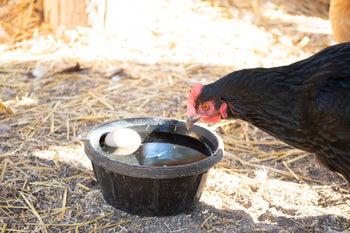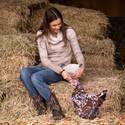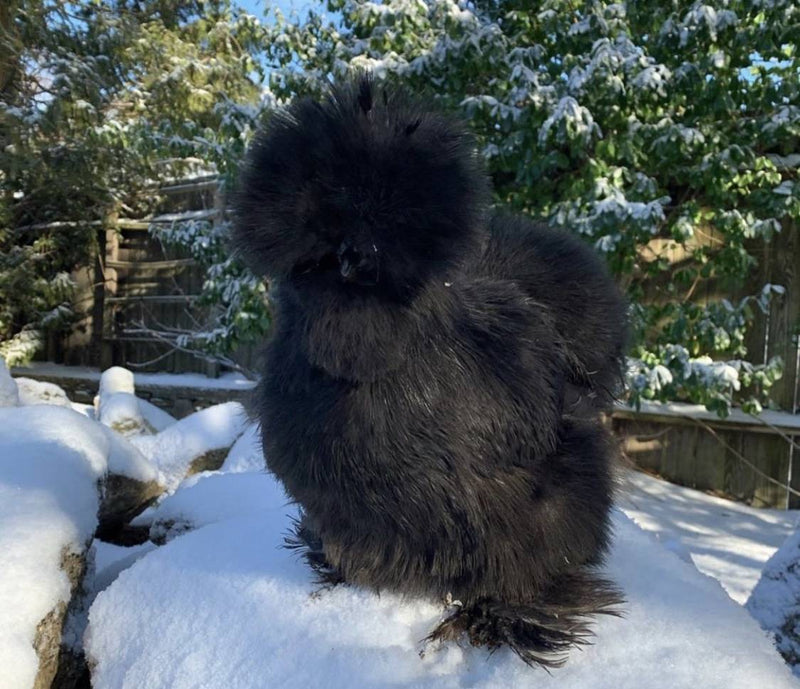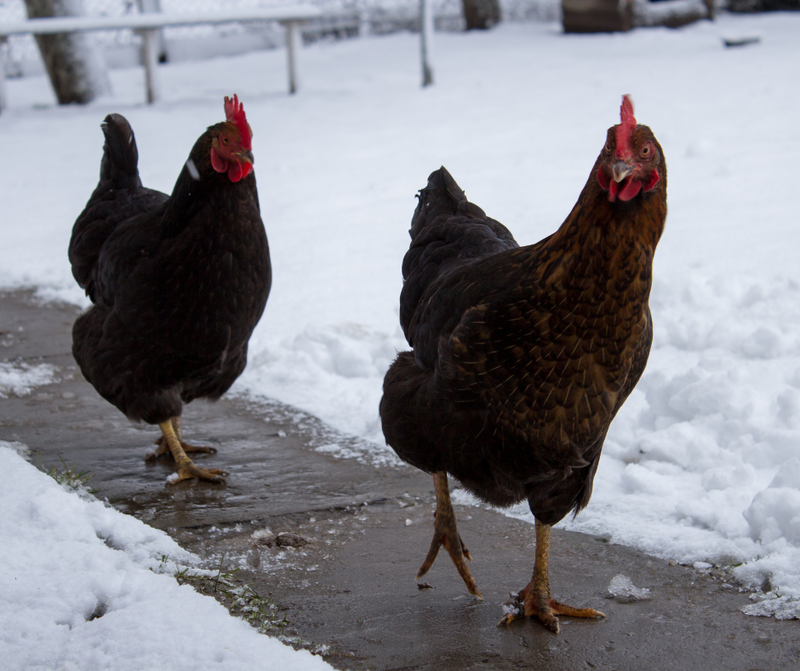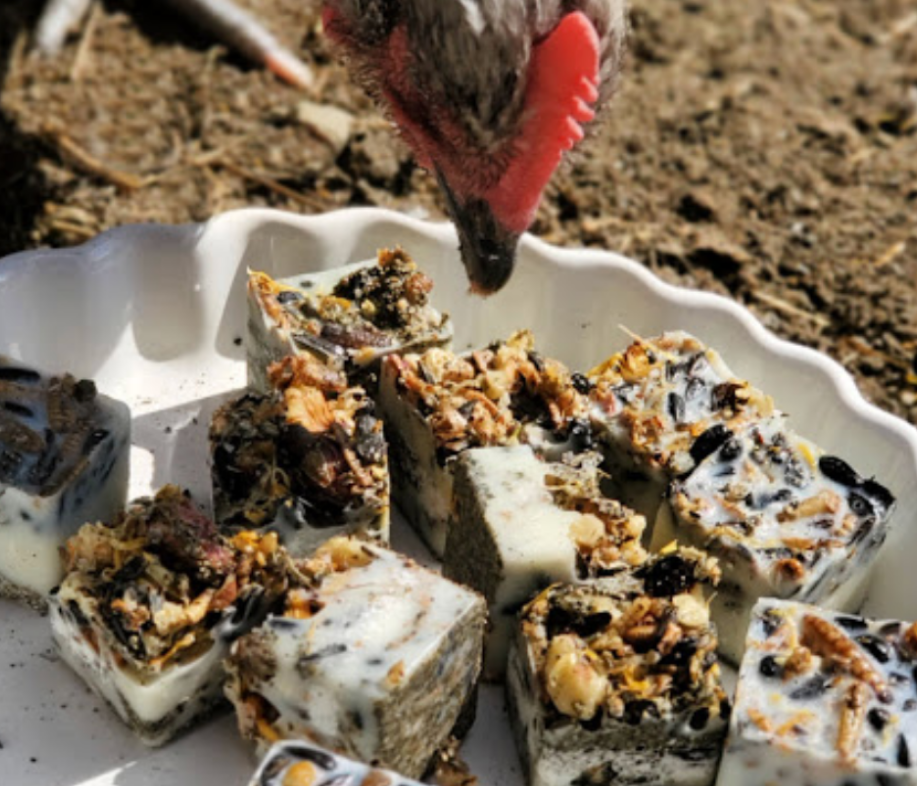Although chickens are small in size, they require up to a pint of fresh water daily to prevent dehydration. One of the biggest challenges of winter chicken keeping is making sure your flock’s water stays unfrozen even when the temperatures drop. This is especially hard for northern chicken keepers who experience extreme weather and temperature dips during the winter months.
Whether you live in an area that has mild winters or your region experiences extreme winter weather, knowing some different methods for how to keep your flock’s water from freezing can save you time and keep your flock healthy and hydrated! While not every method will work for frigid weather, most of them should keep water unfrozen even when the temperatures hover around freezing. These six methods to keep your flock’s water unfrozen will give you plenty of options- no matter the winter weather!
Compare 6 Chicken Water Heating Options
Not all coops or flocks have the exact same needs. Compare and choose a method that will keep your chickens' water from freezing based on your climate, coop characteristics and more.
1. Poultry Water Heaters 
The most reliable way to keep your flock’s water from freezing is by using a poultry water heater method. This method does require electricity and means you will have to install or run power cables if your coop currently doesn’t have it. While electricity at the chicken coop is very handy to have, it is sometimes a hassle.
Heated Water Bases
Heated water bases for poultry are one option. Many companies make heated water bases which can be placed out at the coop and a bell water system can be placed on the base. The heated base turns on when the temperature gets below a certain degree and the base keeps the water just warm enough so that it doesn’t freeze. Most heated water bases do require electricity. Keep in mind that it is best to use plastic water systems on top of the heated bases since galvanized or metal water systems will rust.
A DIY Heated Water Base
A common substitute for buying a poultry water heater is making your own DIY heated water base using a 25-40 watt lightbulb and a tin container or a hollow cement block.
These systems have you rig up a light bulb enclosed in a safe container that a water system can be set on top of in the chicken coop or enclosure. The light bulb can be turned on to generate just enough heat to keep the water from freezing.
When making your own heated water base for the chicken coop, you MUST make sure all electrical connections are done correctly and safely.
A Heated Pet Water Bowl
Lastly, consider using heated pet bowls. Heated pet bowls function wonderfully for keeping your flock’s water unfrozen, however, they do allow the water to get dirtier. Since more water surface area is exposed, it makes it easier for dirt and debris to be flung into the water. Raising the heated pet bowl up on several blocks so that it is at the height of your shortest bird’s back will help keep the water a little cleaner.
Careful Consideration of Electric Water Heater Systems
When using a water heating system that requires electricity, always make sure all the electrical connections are done safely and correctly. Do not use extension cords at the chicken coop. Try to keep all electrical connections out of reach of your flock. Make sure there are no cords that your chickens could accidentally trip over, fly into, or pull out.
Since heated water systems are very reliable in below-freezing temperatures, they may be a good investment if you live in a region where the winters are harsh and cold.
2. Black Water Containers
While electrically sourced heating systems are the most reliable way to keep your flock’s water from freezing, there are some off-the-grid methods that can help prevent water from freezing. In regions where the winter temperatures are milder, these off-the-grid options may work just as well without the hassle of bringing electricity to your chicken coop.
One off-the-grid option utilizes the sun’s heat to keep your flock’s water from freezing. Black objects absorb the heat from the sun and retain that heat for quite a while, despite cold temperatures. By placing your flock’s water in a black object or on top of a black object, the heat absorbed by the black surface can keep the water from freezing. Here are several ideas that may work for your flock’s water system:
- Old tires- place waterers in or on an old tire
- Rubber livestock tubs- use small rubber livestock bowls or tubs for your flock’s water source
- Black plastic- wrap black plastic around a block of wood or other flat object and use it as a water system stand
Sunlight Required
No matter what system you use, you will have to make sure the water system is exposed to some sunlight in order for the black surface to heat up enough to keep the water from freezing.
You will need to clean the water system on a daily basis to keep algae from building up and becoming a health hazard for your flock. Also, make sure the water system can’t be tipped over by your flock!
3. Saltwater Bottle
The salt-water bottle trick can be an effective way to keep your flock’s water from freezing during cold temperatures. You do NOT add salt to your flock’s drinking water! Drinking saltwater will kill your chickens.
Instead, enclose saltwater in a secure bottle and place the bottle in your flock’s water source. The bobbing, saltwater-filled bottle will keep the water from freezing since salt naturally lowers the freezing point of water.
How to Make a DIY Saltwater Bottle System for Your Chickens
- To make the saltwater solution, bring about 3 cups of water to a boil.
- Once boiling, remove the water from the heat source and add 1/3 cup of salt. Stir until the salt is dissolved.
- Allow the mixture to cool slightly if you are pouring the mixture into a plastic bottle.
- Pour the saltwater solution into a bottle that will fit in your flock’s water source. Make sure the lid is very securely sealed and that there are no leaks. You can then place the bottle in your flock’s water to prevent it from freezing.
Don't Forget to Double-Check
You will still want to check on your flock’s water periodically during freezing weather. If the salt-water bottle starts to freeze, it could crack and contaminate your flock’s water.
The saltier the saltwater, the less likely it is to freeze very quickly. Water that is salt saturated (as much salt is dissolved into the water as it can hold) will freeze at -6°F.
4. Warm Water & Water Containers
Providing your flock with warm water in an already warmed water system can keep your flock’s water from freezing when cold temperatures are not prolonged or not too severe. The warmer the water, the longer it will take to freeze.
Find a Balance
However, there is a caveat to this trick: chickens won’t drink water that is too warm. You don’t want your flock to get dehydrated during cold weather, so making sure the water is still palatable is essential! In general, using room temperature water or slightly lukewarm water will still be acceptable for your flock.
Warm the Water System
Putting the water in a water system that has also been warmed will help retain the heat and prolong the time in which the water will freeze.
You can warm your flock’s water system by cleaning it with hot water. This method works well if the temperatures are cold in the morning but warm up in the afternoon.
Just bring out the warm water in the morning and it should stay thawed until the outside temperatures warm up enough. If the cold temperatures persist throughout the day, you will need to refill and re-warm the water system periodically throughout the day or see about using a different method to keep the water from freezing.
5. Mini Greenhouse
You can also build a mini greenhouse! A greenhouse works to trap some of the energy and warmth from the sun. Similar to how black surfaces absorb heat, greenhouses work to trap the heat.
How to Build a Mini-Greenhouse for Your Chickens' Water
A mini greenhouse can be built from a variety of materials including old windows or clear, heavy-duty plastic.grub
Two old windows can be fashioned together to make a tent-like greenhouse which the water system can be placed underneath. You could also build a wooden frame and secure clear plastic to it to create a greenhouse shelter for your flock’s water system.
Add Sun
The mini greenhouse should be in a sunny location to trap heat from the sun. Between the heat trapped by the greenhouse effect and reducing the amount of wind-chill that reaches the water, your flock’s water may stay unfrozen even in below-freezing temperatures.
Keep in mind that you will have to clean your flock’s water system daily since the additional warmth and sunshine will stimulate algae growth.
6. Keep it Moving
Lastly, another way to keep your flock’s water from freezing during cold temperatures is by keeping the water moving. Moving water does not freeze as quickly as still water.
There are several ways you can stimulate movement in your flock’s water source:
- Golf balls- any object that will float and bob in the water can stimulate water movement
- Fountain- create a mini fountain as a water source for your flock
- Aerator- an aerator will create bubbles in the water source
- Filter- use a fish tank filter without the actual filter just to keep the water circulating
The faster the water is moving, the longer it will take for the water to freeze. Some of these systems may require electricity, but other options can easily be set up without needing a power source. Always keep the safety and health of your flock in mind and don’t use a water movement system that could potentially contaminate your flock’s water.
Hydrated Chickens = Healthy Chickens!
Whether harsh or mild winter weather, these six ways to keep your flock’s water from freezing should give you plenty of options to try! From off-the-grid methods to using an electric water heating system, there’s ideas for keeping water unfrozen no matter how your coop is built. Keep your flock hydrated and healthy this winter with fresh water and a nutritious diet!
For more tips on making sure your flock is winter-ready, make sure you check out 5 steps to winterize your coop and these tips for keeping your chickens safe in winter!





